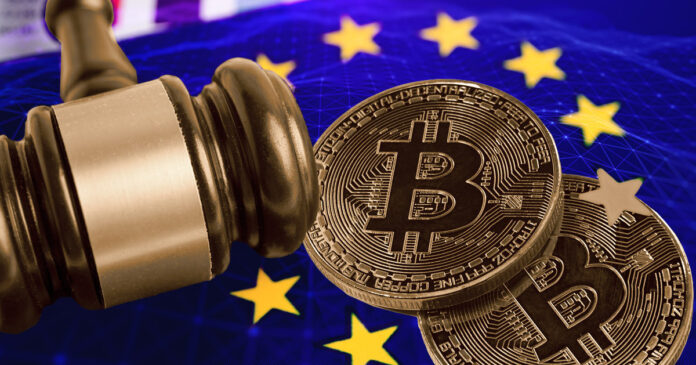The E.U. Parliament, Council, and Commission tripartite reached a provisional agreement in June 29 on the Transfer of Funds Regulation (TOFR). The TOFR constitutes a part of the regulatory frameworks the E.U. is setting up for cryptocurrency regulation.
Upon implementation, crypto-assets service providers (CASPs) in the E.U. will be obliged to comply with the rules and adjust their internal policies and procedures accordingly.
The rules will become effective 18 months after the MiCA regulation is applied.
Regulating the crypto wild west
The TOFR introduces several anti-money laundering rules that seek to collect data on cryptocurrency transactions.
In a series of tweets on the provisional agreement, Ernest Utasun, an E.U lawmaker, branded the agreement an answer to the “unregulated crypto wild west.”
According to him, the TOFR rules apply to every transaction, even if it’s not more than a Euro. Including transactions carried out at crypto ATMs. In addition, CASPs will have to collect data on unhosted wallet transactions. This data includes transactions made to and received from unhosted wallets.
The rule further requires that the identities of unhosted wallets owner are verified on transactions above 1000€. These rules on unhosted wallets seem informed by thoughts that illicit actors primarily use them to facilitate crimes.
Another potential topic of contention that could have led to these regulations are the reports on Russia leveraging cryptocurrencies to avoid financial sanctions. Given that as part of these rules, CASPs must bring their operations in conformity with economic sanctions imposed by the E.U.
However, the rules do not apply to peer-to-peer (P2P) transactions. Meaning that upon implementing the TOFR rules, users uncomfortable with the data collection could migrate to P2P transactions.
The rules will also regulate digital asset providers’ relationships with CASPs in third-world countries, especially where these providers are unregulated and unlicensed.
Speaking on the rules, E.U policymaker Ondřej Kovařík tweeted:
EU institutions have found a provisional political agreement on the Transfer of Funds Regulation. I believe it strikes the right balance in mitigating risks for fighting money laundering in the crypto sector without preventing innovation and overburdening businesses. pic.twitter.com/k0P0I3Ah6K
— Ondřej Kovařík (@OKovarikMEP) June 29, 2022
The crypto asset provider will safeguard the data collected on transactions and make them available to the E.U.
Concerns about the TOFR rules
The E.U. has recently increased its effort to implement regulatory frameworks for cryptocurrency activities. The several institutional crises recorded in the crypto market since 2022 have further intensified this need.
However, experts and analysts consider the regulatory attempts a move to stifle cryptocurrency use in the E.U. The concerns also echo that the TOFR rules constitute a breach of citizens’ right to privacy.
Rather than aid the growth of cryptocurrency, many believe the regulations will delay blockchain development in the E.U. and stifle innovation. Another potential negative impact lies in the requirement to collect data on all transactions could make crypto exchange activities unnecessarily slow and expensive.
Likewise, the security of the data collected has come under criticism. Many opine that pooling the data with CASPs and the governments could make them vulnerable to attacks.
The European Agency, the European Commission, and European Banking Authority are some of the E.U. institutions that have suffered attacks in the past.
Credit: Source link






















 Bitcoin
Bitcoin  Ethereum
Ethereum  XRP
XRP  Tether
Tether  Solana
Solana  USDC
USDC  Dogecoin
Dogecoin  Cardano
Cardano  Lido Staked Ether
Lido Staked Ether  TRON
TRON  Chainlink
Chainlink  Avalanche
Avalanche  Wrapped Bitcoin
Wrapped Bitcoin  Wrapped stETH
Wrapped stETH  Stellar
Stellar  Sui
Sui  Toncoin
Toncoin  Hedera
Hedera  Shiba Inu
Shiba Inu  WETH
WETH  LEO Token
LEO Token  Litecoin
Litecoin  Polkadot
Polkadot  Bitget Token
Bitget Token  Bitcoin Cash
Bitcoin Cash  Hyperliquid
Hyperliquid  USDS
USDS  Uniswap
Uniswap  Wrapped eETH
Wrapped eETH  Ethena USDe
Ethena USDe  Pepe
Pepe  MANTRA
MANTRA  NEAR Protocol
NEAR Protocol  Aave
Aave  Monero
Monero  Ondo
Ondo  WhiteBIT Coin
WhiteBIT Coin  Aptos
Aptos  Internet Computer
Internet Computer  Official Trump
Official Trump  Mantle
Mantle  Ethereum Classic
Ethereum Classic  Dai
Dai  Cronos
Cronos  POL (ex-MATIC)
POL (ex-MATIC)  Bittensor
Bittensor  OKB
OKB 
